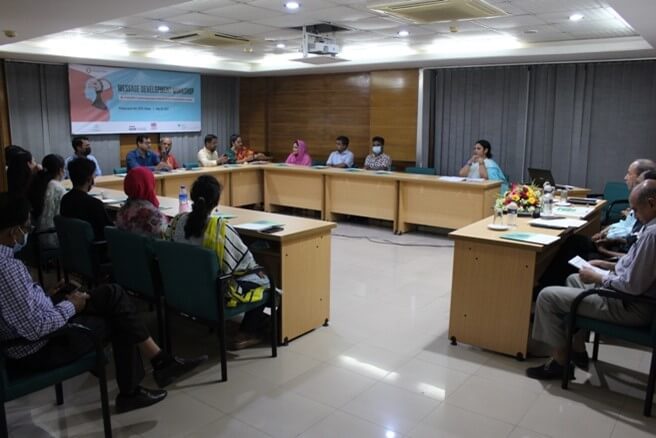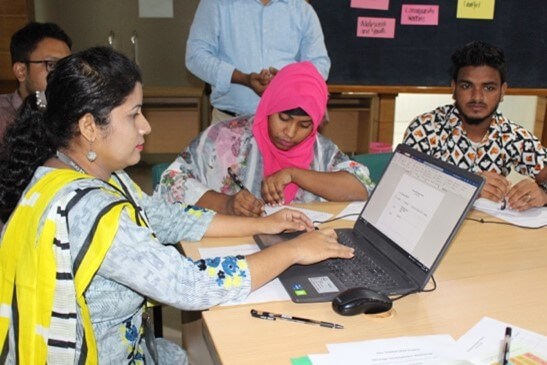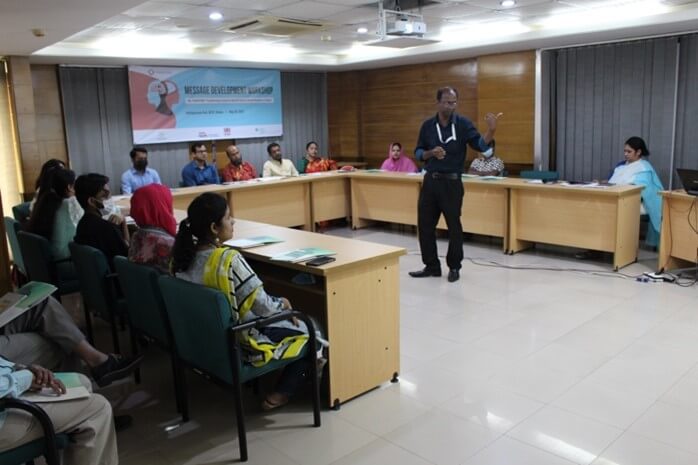Appropriate message development will connect people with serious mental disorders
 A day-long workshop on message development emphasized on the importance of communicating with the community and engaging them to support for helping people with serious mental disorders living in poor urban areas accessing to quality mental health care. This workshop was held under the Transforming Access to Care for Serious Mental Disorders in Slums (TRANSFORM) project. The TRANSFORM project is a partnership between the University of Warwick, UK, The University of Ibadan, Nigeria, and the Telepsychiatry Research and Innovation Network (TRIN), Bangladesh. As a partner of TRIN Ltd., Bangladesh Center for Communication Programs (BCCP) is working in this project to support the TRANSFORM Project through Community Engagement Activities and Development of Communication Materials.
A day-long workshop on message development emphasized on the importance of communicating with the community and engaging them to support for helping people with serious mental disorders living in poor urban areas accessing to quality mental health care. This workshop was held under the Transforming Access to Care for Serious Mental Disorders in Slums (TRANSFORM) project. The TRANSFORM project is a partnership between the University of Warwick, UK, The University of Ibadan, Nigeria, and the Telepsychiatry Research and Innovation Network (TRIN), Bangladesh. As a partner of TRIN Ltd., Bangladesh Center for Communication Programs (BCCP) is working in this project to support the TRANSFORM Project through Community Engagement Activities and Development of Communication Materials.
As the TRIN Bangladesh has an understanding about how the mental disorder is perceived and treated, that will lead them to work with traditional healers, health workers and professionals to develop training program. While working with traditional healers and community health workers, community engagement will be required to make them aware about their support for accessing to the local mental health services. Appropriate message will be the key to plan for and conduction of the community engagement and community awareness effort aiming which the message development workshop was planned and organized.
The workshop was participated by 14 participants includes 4 CHW, 2 youth leader, 2 community leader, 3 script writer and 1 designer along with 2 mental health experts. A brief opening ceremony was attended by Dr. Tanjir Rashid Soron, Principal Investigator, TRANSFORM Bangladesh Site, Mr. Motaherul Haque, Adviser (Corporate), BCCP and Mr. Shafiqur Rahman, Adviser (Dev.), BCCP. In his opening remarks Dr. Tanjir Rashid Soron mentioned that “only about 8% of the patients bearing with mental disorders are receiving health care and treatment services. In this context appropriate message development will connect people with serious mental disorders living in poor urban areas accessing to quality mental health care.”
 A combination of Reflection, Discussion and Synthesis (RDS) methodology was applied in the workshop that led the participants to follow through the presentation, discussion, question-answer, group work and group presentations. The group work found key message themes for 3 basic SBCC materials for the following target audience groups:
A combination of Reflection, Discussion and Synthesis (RDS) methodology was applied in the workshop that led the participants to follow through the presentation, discussion, question-answer, group work and group presentations. The group work found key message themes for 3 basic SBCC materials for the following target audience groups:
Basic SBCC materials |
Basic Information to provide |
Target Audience group |
Leaflet |
|
|
Poster |
|
|
Banner |
|
|

